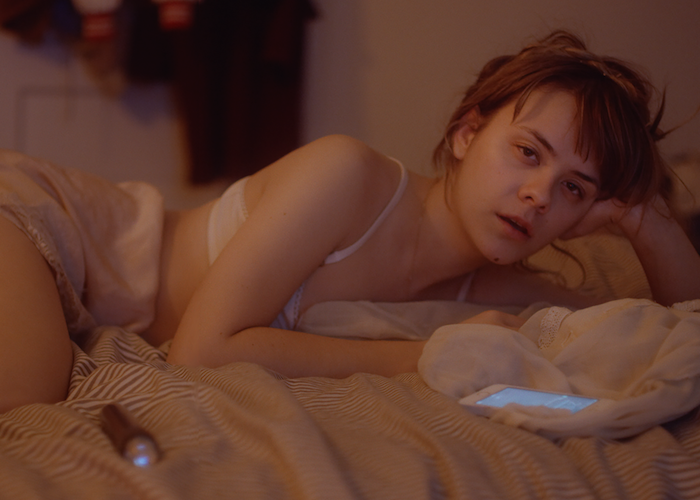If you experience flashbacks upon hearing the mere ping of a Tinder message, “Wobble Palace” is for you. It’s essentially a modern romantic-comedy, in that it’s about the open relationship of two hipsters who don’t really like each other, while they pursue connections (via Tinder or real life) that often end in quirky hook-ups. The film, premiering at SXSW this weekend, is designed especially for those who can see themselves within the social culture that these inspired characters inhabit, even if one considers themselves aesthetically different than Los Angeles hipsters Eugene (co-writer/director Eugene Kotlyarenko) and Jane (co-writer Dasha Nekrasova). While your comedic milage with its loose goofiness may vary, this movie succeeds in contributing a filmic time capsule that all generations need; “Wobble Palace” aptly shifts between cathartic and uncomfortable, but it’s always recognizable.
“Wobble Palace” is the name of the home that Eugene and Jane share in Los Angeles, its interior of astro turf, bright colors and more designed mostly by Jane, an artist. They share a bed on some nights, but Kotlyarenko’s movie focuses on two days, (with the 2016 election drawing near) in which they both have access to the house and its bedroom.
Kotlyarenko is sincere with the core emotions of his distant couple, which allows him and Nekrasova to have some fun in their respective leading halves of the film. Eugene is a disheveled, aggressively quirky guy who dresses for his hook-ups like a demented children’s show host, his long hair even used as a type of prop. He proclaims to the women he interacts with on October 30, 2016 that he’s progressive and not pushy, but his interactions with women are pointed toward the type of person he really is; selfish, entitled, obnoxious in no revelatory way. As a director, this puts the story into territory that seems to be ironic about being ironic, especially as it settles into tone and allows the viewer to get a better feel for the film’s overall perspective. But along with some rough acting, this chunk of the story can have the slightness and lip-service nature of a contemporary “Saturday Night Live” skit, where calling out faux-woke dudes leaves more cleverness to be desired.
But “Wobble Palace” picks up and flies when it focuses on Jane’s story on October 31, 2016, as she has her own interests as an artist who has seemingly worked all kinds of jobs, but is stuck in more ways than one. She has compelling conversations with her friend Marcello (Elisha Drons) and charming interactions with a hook-up named Ravi (Vishwam Velandy); among goofing around and various usages of their phones like FaceTime or sending nudes, “Wobble Palace” touches upon culturally specific ideas without being on-the-nose. All the while, her story becomes more universal and timeless about the ache of relationships and meeting new people, but it isn’t cliche given how specific it feels to 2016.
There is an ambition to “Wobble Palace” that unfolds as it goes along, as it wants to be about so much that is relevant today: the true meaning behind terms like “basic,” “cuck,” “triggered,” “negging”; the viciousness of dating apps; the responsibilities that are and aren’t expected of Millenials; gentrification; cisgender heterosexual male feminism; the impending election of Donald Trump. Even if some ideas are handled with more poignancy than others (the pre-Trump setting is one of its least effective), they pack the movie to keep it compelling, as if engaging in the many inner debates its viewers were already having before the movie started.
The integrity of “Wobble Palace” is further established by its attention to detail, which starts with in-depth ideas of an iMessage conversation (the beginning is compelling as we see fragments of a relationship through years of scrolled texts). The title location is specifically rife with design, its window curtains showing screenshots of AOL Instant Messenger on a Windows computer, the ancestor to calculated Tinder messages on cracked iPhones. Noteworthy cinematographer Sean Price Williams (“Good Time,” “Kate Plays Christine”) uses diffused lens to create a look that’s slightly foggy but a tiny bit fantastical. It proves to be a good counter for the poppy atmosphere it documents, where people of colorful self-expression like Eugene and Jane can only go dark and inward to find a type of contentment.
“Wobble Palace” is the fifth feature by Kotlyarenko, whose IMDb page hints at other indies curious about modern relationships and technology. I am unfamiliar with his work but it seems fair-game nonetheless to call his talent fresh, someone who viewers should keep an eye out for, and seek out his previous stories, too.












